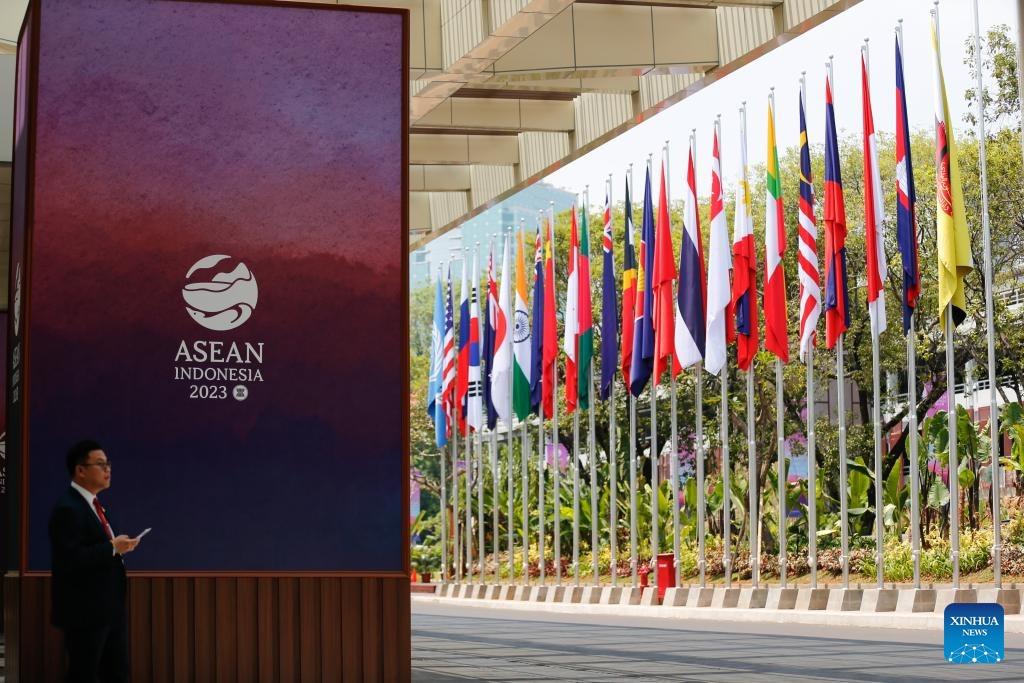 A man is pictured at the venue of the 43rd Association of Southeast Asian Nations (ASEAN) Summit in Jakarta, Indonesia on Sept 5, 2023. (PHOTO / XINHUA)
A man is pictured at the venue of the 43rd Association of Southeast Asian Nations (ASEAN) Summit in Jakarta, Indonesia on Sept 5, 2023. (PHOTO / XINHUA)
Indonesia keeps its optimism that the Association of South East Asian Nations will be able to make breakthroughs in negotiations for the Code of Conduct in the South China Sea despite some people’s disappointment on the progress of negotiations about that issue in last month’s ASEAN Summit and related summit meetings.
“As for Indonesia, we are quite optimistic that we (ASEAN) can make a number of breakthroughs when it comes to negotiations on the COC,” Sidharto R. Suryodiopuro, Indonesia’s Director General for ASEAN Cooperation, told a discussion forum in Jakarta on Friday (Sept 15).
READ MORE: China, Indonesia ready to align growth strategies in BRI ties
Held by Foreign Policy Community of Indonesia, the discussion aimed to review the 43rd ASEAN Summit 2023 which took place in Jakarta on Sept 5-7 under Indonesia’s chairmanship. Suryodipuro’s optimism was in response to another keynote speaker, Shafiah F. Muhibat, deputy executive director for research at Jakarta-based Center for Strategic and International Studies, who said that there had been high expectations in the public about what Indonesia could have actually achieved as the chair with regards to issues such as the South China Sea disputes.
TAC stands for Treaty of Amity and Cooperation in Southeast Asia which was established in 1976 and embodies universal principles of peaceful existence and friendly cooperation among states in Southeast Asia. As many as 43 non-ASEAN member states have now acceded to TAC with China being the first dialog partner of the association to accede the treaty in 2003
The COC is aimed to achieve a stable, safe and peaceful South China Sea and it reflects international norms, principles and rules.
In July ASEAN and China agreed on Guidelines to accelerate negotiations for the COC in the South China Sea during the meeting in Jakarta between ASEAN foreign ministers and Director of the Foreign Affairs Committee of the Central Committee of the Communist Party of China and Foreign Minister Wang Yi.
Only some members of ASEAN and China as well as its Taiwan region are involved in conflicting island and maritime claims in the South China Sea. Those include the Philippines which opened new military bases to the United States close to China’s territories.
READ MORE: HK seen as a gateway for ASEAN businesses to expand market
The Chairman’s Statement of the 43rd ASEAN Summit, among others states, “We reaffirmed the importance of the TAC as the key code of conduct in governing inter-state relations in the region and as a foundation for maintaining regional peace and stability.”
TAC stands for Treaty of Amity and Cooperation in Southeast Asia which was established in 1976 and embodies universal principles of peaceful existence and friendly cooperation among states in Southeast Asia. As many as 43 non-ASEAN member states have now acceded to TAC with China being the first dialog partner of the association to accede the treaty in 2003.
Muhibat said, “I think South China Sea is one way … We can see either as criticism or more as a disappointment because there as I say there are very high expectations about what Indonesia could achieve throughout this year with regard to the COC process and as a whole in the management of the South China Sea dispute.”
READ MORE: Sino-ASEAN ties hold promise
On this criticism Suryodipuro said that the Declaration on Conduct of the Parties in the South China Sea (DOC) signed by ASEAN and China in Phnom Penh 21 years ago, had shaped behavior of countries around the South China Sea. DOC served as guidelines for ASEAN member countries and China to maintain peace and stability based on the spirit of cooperation and mutual trust.
“Almost no and perhaps none freedom of navigation was hampered in the South China Sea,” he said.
Achievements have been made with regard to the COC and they were not because of the loud noise ASEAN made but because there was no noise at all, Suryodipuro said.
Robert Matheus Michael Tene, deputy secretary general of ASEAN for Political-Security Community, told participants at last Friday’s meeting that so far there had been many rounds of COC discussions or negotiations.
READ MORE: China-ASEAN expo set to promote trade, investment
During Indonesia’s chairmanship the second reading or discussion of the COC draft was completed by almost mid-year. Indonesia therefore plans to host the next round of COC draft discussion by the end of this year.
Beside the COC, also extensively discussed last Friday was the issue of Myanmar.
Muhibat lauded ASEAN Summit’s stronger statements on Myanmar while Suryodipuro reminded that the complexity of that country’s situation is layered.
On Myanmar, the 43rd ASEAN Summit Chairman’s Statement said, “We discussed the development in Myanmar, particularly the implementation of the Five-Point Consensus and strongly condemned the continued escalation of violence, causing prolonged suffering for the people of Myanmar, humanitarian crisis, the destruction of houses and public facilities such as schools, hospitals, markets, churches and monasteries, and adverse impacts on regional stability, particularly along the border region.”
The Five-Point Consensus are an immediate cessation of violence in Myanmar; dialog among all parties in Myanmar; the appointment of a special envoy; humanitarian assistance by ASEAN; and a special envoy’s visit to Myanmar to meet with all parties.
The writer is a freelance journalist for China Daily.


